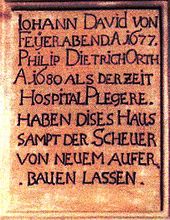Johann David Feyerabend
Johann David Feyerabend (born December 3, 1643 in Heilbronn ; † October 6, 1716 there ) was mayor of the imperial city of Heilbronn from 1683 to 1716 .
Life
Feyerabend came from a family originally from Hall who had come to Heilbronn with his grandfather in 1591. He was the son of Johann Heinrich Feyerabend (1608–1647) and a daughter from the patrician family Schoch / Aff. He matriculated on June 4, 1661 in Tübingen and on September 30, 1663 in Jena to study law. Back in Heilbronn he became legal counsel, and in 1671 a member of the city court. From 1673 he belonged to the small, inner patrician council of the imperial city. In 1677 he became tax master . In 1680 his brother Georg Heinrich Feyerabend became one of the then three mayors of Heilbronn . In 1683 Johann David also became mayor, so that until the death of Georg Heinrich in 1685 a couple of brothers presided over the city council. From 1682 Johann David Feyerabend was also Vogt von Flein .
In 1677 Feyerabend was the nurse of the Heilbronn Katharinenspital , in this function he was involved in the reconstruction of the Böllinger Hof near Neckargartach , which belonged to the hospital . During Johann David Feyerabend's council time, the city of Heilbronn was occupied by the French army for a few months in the late 1688 during the War of the Palatinate Succession . After the liberation of Heilbronn by troops from the Electorate of Saxony, the army took Mayor Feyerabend with them as one of nine hostages on their retreat into the surrounding area in order to extort money from the imperial city. His son Georg David (born April 23, 1669 in Heilbronn; † May 23, 1713 in Lehrensteinsfeld ) made himself available as a hostage in exchange with his father. The French accepted and released the father. Other hostages were abducted for over a year.
Feyerabend lived in the former beguinage near St. Wolfgang . He also owned a fulling mill at Heilbronner Bollwerksturm , which he sold to Jakob Mieser in 1708, whereupon the latter set up the third Heilbronn paper mill , from which Gustav Schaeuffelen's company later emerged.
Mayor Feyerabend was first married to Katharina Frommold geb. Blank and second marriage to Anna Katharina Zobel. The first marriage had seven children, as noted on Feyerabend's gravestone. He had three children with the second wife: Georg David, Anna Elisabeth and Regina Catherina. Anna Elisabeth's daughter, Maria Christina, married Georg Conrad Pancug, son of the mayor Georg Friedrich Pancug . Regina Catherina was married to the son of the mayor Johann Georg Geiling for the second time . The Heilbronn patricians had close family ties, and the frequent weddings had a political meaning, as people in law could also find a place in the town council, which was dominated by patricians.
Feyerabend served as a model for the book "The Mayor and His Son" by Philipp Spieß (a pseudonym of the town pastor Staehle). His tomb is in the old cemetery of Heilbronn .
The Heilbronn Feyerabendstrasse is not named after him, but after a descendant, the paper manufacturer and member of the state parliament Adolf Feyerabend (1842-1891).
bibliography
- Bernd Klagholz: Heilbronn and its mayors in the period from the 16th to the 19th century. Tübingen 1980, p. 63, (Tübingen, Univ., Approval work).
- Gerd Wunder: Feyer evening. History of a bourgeois family in Hall and Heilbronn. Series of publications by the Alt-Hall Association; H. 11. Schwäbisch Hall, 1986.
- Heilbronn in the Palatinate War of Succession (addendum). In: Swabia and Franconia. No. 12 December 1988, ZDB -ID 128017-x , p. III.
| personal data | |
|---|---|
| SURNAME | Feyerabend, Johann David |
| BRIEF DESCRIPTION | Mayor of the imperial city of Heilbronn (1683–1716) |
| DATE OF BIRTH | December 3, 1643 |
| PLACE OF BIRTH | Heilbronn |
| DATE OF DEATH | October 6, 1716 |
| Place of death | Heilbronn |


